
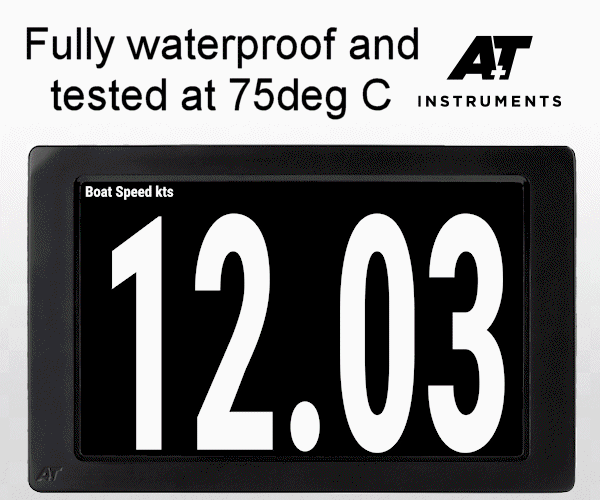


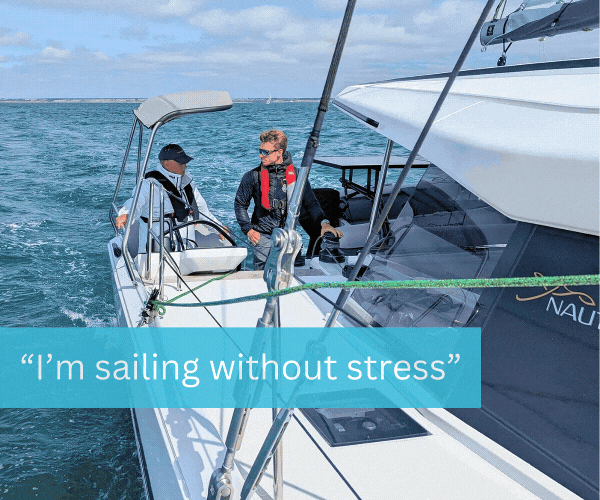




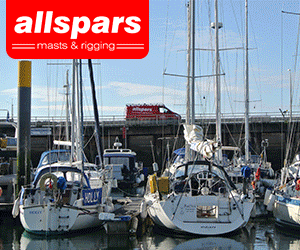



Boats for sale
| Laser 28 - Excellent example of this great design Hamble le rice |
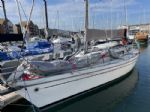 |
| Laser 140101 Tynemouth |
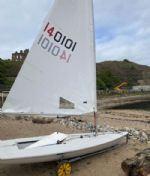 |
| Rossiter Pintail Mortagne sur Gironde, near Bordeaux |
 |
List classes of boat for sale |
Android Start Line Apps Anyone? |
Post Reply 
|
Page 123> |
| Author | ||
RS400atC 
Really should get out more 
Joined: 04 Dec 08 Online Status: Offline Posts: 3011 |
 Post Options Post Options
 Quote Quote  Reply Reply
 Topic: Android Start Line Apps Anyone? Topic: Android Start Line Apps Anyone?Posted: 26 Feb 13 at 5:10pm |
|
I was using precise GPS in its general sense, not in a proprietary sense. I wouldn't expect anyone who can't spell 'know' to appreciate the difference though. However, let's put all that aside, this is not the place for this discussion. Would you agree that the OP is wasting his time with a simple GPS ap to tell if a dinghy is over the line? |
||
 |
||
RTFM 
Groupie 
Joined: 23 Nov 10 Online Status: Offline Posts: 41 |
 Post Options Post Options
 Quote Quote  Reply Reply
 Posted: 26 Feb 13 at 7:50am Posted: 26 Feb 13 at 7:50am |
|
|
So what part of my Differential GPS explainiation do not understand? In did not say anthing about precise GPS - that's RTK which I assume you also no nothing about...
|
||
 |
||
sargesail 
Really should get out more 
Joined: 14 Jan 06 Location: United Kingdom Online Status: Offline Posts: 1459 |
 Post Options Post Options
 Quote Quote  Reply Reply
 Posted: 25 Feb 13 at 11:27pm Posted: 25 Feb 13 at 11:27pm |
|
Indeed - even differential GPS can involve two moving receivers.
|
||
 |
||
RS400atC 
Really should get out more 
Joined: 04 Dec 08 Online Status: Offline Posts: 3011 |
 Post Options Post Options
 Quote Quote  Reply Reply
 Posted: 25 Feb 13 at 11:25pm Posted: 25 Feb 13 at 11:25pm |
|
Yes, that helps me see that you don't really know very much about precise GPS. I suggest you set up a mock start line and see what happens. Any time spent on Android apps could be more profitably be spent I think. |
||
 |
||
RTFM 
Groupie 
Joined: 23 Nov 10 Online Status: Offline Posts: 41 |
 Post Options Post Options
 Quote Quote  Reply Reply
 Posted: 25 Feb 13 at 10:22pm Posted: 25 Feb 13 at 10:22pm |
|
|
>>To get relative postions with any great accuracy, you have to make sure the receivers are prioritising
>>the same satellites. That is how Differential GPs gets much better accuracy. Not quite correct. If I may explain... Differential GPS involves the cooperation of two receivers, one that's stationary and another that's roving around making position measurements. The stationary receiver is the key. It ties all the satellite measurements into a solid local reference. Remember that GPS receivers use timing signals from at least four satellites to establish a position. Each of those timing signals is going to have some error or delay depending on what sort of perils have befallen it on its trip down to us. Since each of the timing signals that go into a position calculation has some error, that calculation is going to be a compounding of those errors. Luckily the sheer scale of the GPS system comes to our rescue. The satellites are so far out in space that the little distances we travel here on earth are insignificant. So if two receivers are fairly close to each other, say within a few hundred kilometers, the signals that reach both of them will have traveled through virtually the same slice of atmosphere, and so will have virtually the same errors. Differential GPS can eliminate all errors that are common to both the reference receiver and the roving receiver. These include everything except multipath errors (because they occur right around the receiver such as masts and sails etc) and any receiver errors (because they're unique to the receiver). That's the idea behind differential GPS: We have one receiver measure the timing errors and then provide correction information to the other receivers that are roving around. That way virtually all errors can be eliminated from the system, even the pesky Selective Availability error that the DoD can put on if they so wish... Hope that helps...
Edited by RTFM - 25 Feb 13 at 10:28pm |
||
|
Nobby.
|
||
 |
||
RS400atC 
Really should get out more 
Joined: 04 Dec 08 Online Status: Offline Posts: 3011 |
 Post Options Post Options
 Quote Quote  Reply Reply
 Posted: 25 Feb 13 at 10:03pm Posted: 25 Feb 13 at 10:03pm |
|
I think you will find that worked a lot better with Decca. GPS has random errors of the order of 5 to 20m. You can take the same gps back to the same point and be at least 5m out, unless you allow averaging over a few minutes or more. If you have a pure civilian GPS which is reliably better than that, there is a big market for it. |
||
 |
||
polc1410 
Posting king 
Joined: 10 Jan 08 Location: United Kingdom Online Status: Offline Posts: 147 |
 Post Options Post Options
 Quote Quote  Reply Reply
 Posted: 25 Feb 13 at 9:13pm Posted: 25 Feb 13 at 9:13pm |
|
|
not sure if they are reading the GPS direct or just the possition. One of them (I forget which) seemed to be doing lots of very fancy stuff with pitch and yawl etc.
If I was writing the basic GPS algorithm I'd tell it to work out where it should be based on speed and direction travel. That may cause some issues as I almost always tack near the line! RTFM wasn't suggesting you'd be 10m behind (or over) the line. But that it would be able to take you back to the same spot on the same day. The way you configure the start line is to sail to the committee boat and stop with the committee boat about 1m to your starboard side. Hit the RC button and set its possition from the GPS. Then sail to the pin and repeat. So it doesn't matter if the global possition is 10m out provide it stays 10m out for the rest of the day. (Although it'd make me happier if I can save some of the fixed marks for eternity but they will also move a little in wind etc.) |
||
 |
||
RS400atC 
Really should get out more 
Joined: 04 Dec 08 Online Status: Offline Posts: 3011 |
 Post Options Post Options
 Quote Quote  Reply Reply
 Posted: 25 Feb 13 at 8:05pm Posted: 25 Feb 13 at 8:05pm |
|
That makes an awful lot of assumptions. Two gps receivers on the same boat will have similar inputs to their averaging. To get relative postions with any great accuracy, you have to make sure the receivers are prioritising the same satellites. That is how Differential GPs gets much better accuracy. You have a data feed from the reference receiver sharing info about every satellite it sees. They also often have inertial data too. A good surveying GPS would put you in centimetresof the line, if you were moving steadily. Personally a GPS system that assists me in being 10m behind the the line is something I can live without. And even that 10m or whatever is not a maximum error, it may be 66% confidence or even less. It's fine for generating a tracking plot to feed to spectators or the media, but of limited use to the sailors themselves. |
||
 |
||
RTFM 
Groupie 
Joined: 23 Nov 10 Online Status: Offline Posts: 41 |
 Post Options Post Options
 Quote Quote  Reply Reply
 Posted: 25 Feb 13 at 1:56pm Posted: 25 Feb 13 at 1:56pm |
|
|
How accurate is GPS you may ask?
Turn on any GPS receiver and it will give you an approximate horizontal position of 10-15 metres. It does depend on how much positional averaging the manufactures GPS unit does, and if you moving or not. Accuracy is also affected by a number of other factors, including the satellite positions, noise in the radio signal, atmospheric conditions, and barriers to the GPS signals, such as sails and masts. However having a receiver that is accurate to approximately 10 metres is not an issue with the race sailing application, as the 10m accuracy stated above is the absolute position, and not a relative position accuracy. All of the sailing boats within the same race area will have the same GPS errors in there calculated horizontal positions. (The largest error is mainly attributed to the ionosphere & troposphere delays as mentioned above). This can be seen by taking two GPS receivers on a single boat (with the same GPS logging configuration) and the ‘base line’ distances between them will remain reasonably constant. |
||
|
Nobby.
|
||
 |
||
RS400atC 
Really should get out more 
Joined: 04 Dec 08 Online Status: Offline Posts: 3011 |
 Post Options Post Options
 Quote Quote  Reply Reply
 Posted: 24 Feb 13 at 11:24pm Posted: 24 Feb 13 at 11:24pm |
|
|
You have to be aware that when a GPS susses you are still, it will do some averaging to improve accuracy. There is a lot of clever processing that usually works, but may not be right in a dinghy.
For instance some GPS algorithms know that most city streets run E-W or N-s and cheat a little. Works well for the intended purpose, not so good out of context. |
||
 |
||
Post Reply 
|
Page 123> |
| Forum Jump | Forum Permissions  You cannot post new topics in this forum You cannot reply to topics in this forum You cannot delete your posts in this forum You cannot edit your posts in this forum You cannot create polls in this forum You cannot vote in polls in this forum |
Bulletin Board Software by Web Wiz Forums® version 9.665y
Copyright ©2001-2010 Web Wiz
Change your personal settings, or read our privacy policy
Copyright ©2001-2010 Web Wiz
Change your personal settings, or read our privacy policy












 Printable Version
Printable Version Delicious
Delicious Digg
Digg Facebook
Facebook Furl
Furl Google
Google MySpace
MySpace Newsvine
Newsvine reddit
reddit StumbleUpon
StumbleUpon Twitter
Twitter Windows Live
Windows Live Yahoo Bookmarks
Yahoo Bookmarks Topic Options
Topic Options